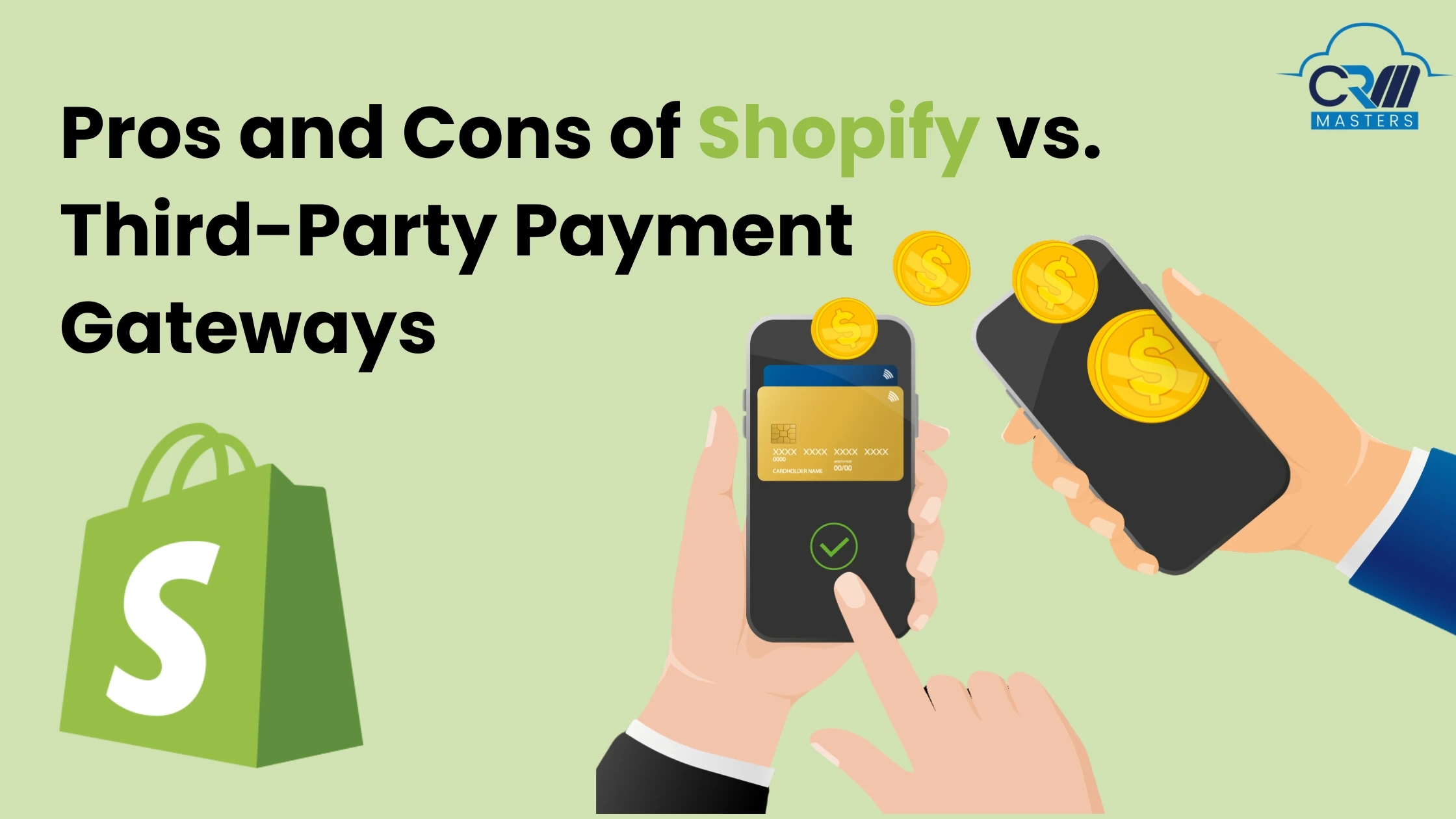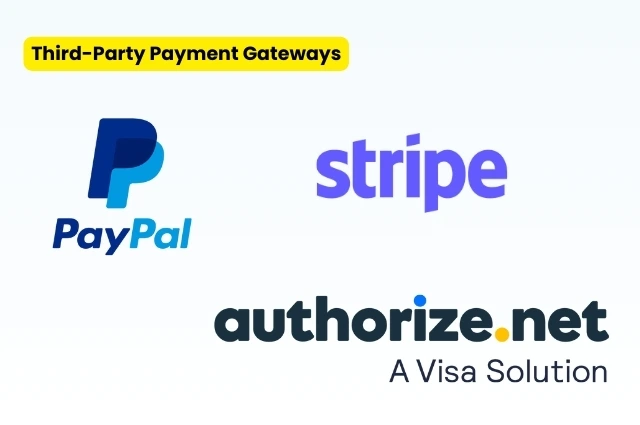
Pros and Cons of Shopify Payment vs. Third-Party Payment Gateways
When setting up an e-commerce store on Shopify, one of the most important decisions you’ll face is choosing a payment gateway. Shopify Payments and third-party payment gateways each come with their own set of benefits and drawbacks.
Making an informed decision can help you optimize your store’s payment process, improve customer experience, and increase your overall business efficiency.
Here, we’ll explore the pros and cons of both options to help you decide which is best for your online store.
What is a Payment Gateway?

A payment gateway is a mechanism that facilitates the transfer of transaction information between a customer and a merchant. It enables the processing of credit card and digital payments securely. While online payment gateways are cloud-based software solutions, in-person retail gateways are often integrated into point-of-sale (POS) systems.
What are the Types of Payment Gateways?
There are three main types of payment gateways:
1. Hosted Payment Gateways
Customers are redirected from your website to the secure transaction processing page of the payment gateway using hosted gateways.
The customer is sent back to your website to continue the checkout process after making the payment.
These gateways are also known as redirect payment gateways.
2. Self-Hosted Payment Gateways
Merchants collect payment details directly on their website and then send this data to a third-party payment gateway in the backend.
The payment processing occurs off-site but offers a seamless experience for the customer.
3. Non-Hosted Payment Gateways
Merchants handle both the collection and processing of payments entirely on their website.
This type of gateway is typically used by larger enterprises due to the high technical requirements and maintenance involved.
Importance of Right Payment Gateway & Shopify Development Partner

A payment gateway is an important part of the process, but it’s only half the job done; you also need to select the right Shopify development partner for your business as it directly affects the customer’s checkout experience, payment security, and your operational efficiency. Factors such as integration options, transaction fees, and customer support should guide your decision.
What Is Shopify Payments?
Shopify Payments is Shopify’s built-in payment processor that allows store owners to accept payments without needing to set up an external payment provider. It simplifies the payment process and integrates seamlessly within the Shopify ecosystem, making it easy for store owners to manage sales, payouts, and payment-related operations from one central dashboard.
Key Features of Shopify Payments
1. Ease of Integration
Shopify Payments is built into the Shopify platform, requiring no additional configuration.
2. Multiple Payment Methods
Supports major credit and debit cards, as well as alternative payment options like Apple Pay and Google Pay.
3. Fast Payout
Earnings are transferred to your account in as little as two business days.
4. Cost-Effective
No additional transaction fees if you use Shopify Payments, as opposed to third-party gateways that often charge a fee.
5. Security
Includes built-in fraud prevention measures to protect your store and customers.
Pros of Shopify Payments
1. Seamless Integration
Shopify Payments is designed to work effortlessly with your Shopify store. The integration process is straightforward—just activate it from your Shopify admin panel, and you’re ready to start accepting payments.
2. Cost Savings
Using Shopify Payments means you avoid the 2% transaction fee that Shopify charges when you use third-party gateways. This can add up significantly, especially for stores with high sales volumes.
3. Faster Payouts
One major advantage is the fast payout process. With Shopify Payments, you can receive your earnings within two business days, ensuring cash flow is consistently managed.
5. Fraud Protection
Shopify Payments includes built-in fraud protection features, making it a secure choice for both store owners and customers.
6. Easy Management
Because Shopify Payments is part of the Shopify platform, you can manage payments, view detailed reports, and analyze transaction data all from one dashboard. This simplifies the management process and saves time.
Cons of Shopify Payments
1. Geographical Limitations
Shopify Payments is only available in specific countries. This can limit store owners in regions where Shopify Payments isn’t supported, forcing them to seek other payment solutions.
2. Limited Advanced Features
While Shopify Payments is excellent for basic transactions, it may not offer some of the advanced features available with third-party payment providers, such as detailed analytics or custom billing options.
3. Less Customizability
You may find Shopify Payments less adaptable to unique business models or complex payment processes compared to some third-party options.
What Are Third-Party Payment Gateways?

Third-party payment gateways like PayPal, Stripe, and Authorize.Net are external services that integrate with your Shopify store to handle transactions. They offer flexibility and can be a better fit for certain business needs, but they come with their own set of advantages and drawbacks.
Key Features of Third-Party Gateways
1. Wide Global Reach
Support for a variety of currencies and countries, making them suitable for international businesses.
2. Enhanced Features
These gateways often come with advanced features such as subscription billing, custom checkout processes, and detailed financial reports.
3. Reputation and Trust
Established payment processors like PayPal and Stripe are trusted by customers around the world, adding an extra layer of comfort and confidence.
Pros of Third-Party Payment Gateways
1. Broader Global Reach
Third-party payment gateways can support transactions in many countries and currencies, making them ideal for stores with a global customer base.
2. Advanced Features
Third-party gateways often offer extra features that can be beneficial for certain businesses, such as detailed transaction reporting, recurring billing, and flexible payment plans.
3. Established Trust with Customers
Popular payment methods like PayPal and Stripe are widely recognized and trusted by customers. This can lead to higher conversion rates as customers feel secure using familiar payment methods.
4. Customization Options
Third-party payment gateways can often be customized to suit unique business needs, offering more flexibility than Shopify Payments.
Cons of Third-Party Payment Gateways
1. Higher Transaction Fees
Most third-party gateways charge a transaction fee, usually around 2-3% per sale. This adds an extra cost that can impact your profit margins, especially for high-volume stores.
2. Complex Setup and Management
Integrating third-party gateways often requires more effort. You may need to create an account with the provider, enter API credentials, and manage the payment process outside of the Shopify platform.
3. Checkout Process Disruption
Some third-party gateways can disrupt the seamless checkout experience by redirecting customers to an external site for payment. Although there are plugins that can integrate third-party gateways into the same page, this can still be an inconvenience for customers.
4. Potential Additional Costs
While many third-party gateways come with robust features, some of them might charge additional fees for premium services or advanced functionalities.
Shopify Payments vs. Third-Party Gateways: Which Should You Choose?
Choosing between Shopify Payments and a third-party payment gateway depends on your specific business needs, budget, and target audience.
Choose Shopify Payments If:
1. You want a simple, integrated payment solution that works seamlessly within the Shopify ecosystem.
2. You’re looking to minimize costs and avoid extra transaction fees.
3. Your business operates in a region where Shopify Payments is supported.
4. You prioritize ease of use and fast payout times.
Choose a Third-Party Payment Gateway If:
1. You need to support international customers and multiple currencies.
2. Your store requires specific features that Shopify Payments doesn’t offer.
3. You want to take advantage of the trust and familiarity customers have with well-known payment providers like PayPal and Stripe.
4. You are comfortable with setting up and managing external integrations.
Get the Best Shopify Development Services with Us!
Choosing the right payment gateway is critical to the success of your Shopify store. Whether you opt for the seamless Shopify Integration Services of Payments or the flexibility of third-party gateways, the decision should align with your business goals, customer preferences, and operational needs.
However, selecting the perfect payment gateway is just one part of the equation. To truly unlock the potential of your Shopify store, partnering with an experienced Shopify Development Company expert is key.
At CRM Masters, we bring technical expertise, creativity, and business insight to help you create a Shopify store that stands out in today’s competitive market.
Connect with us today and let us help you build, optimise, and grow your e-commerce business.
Book a FREE consultation call now!












